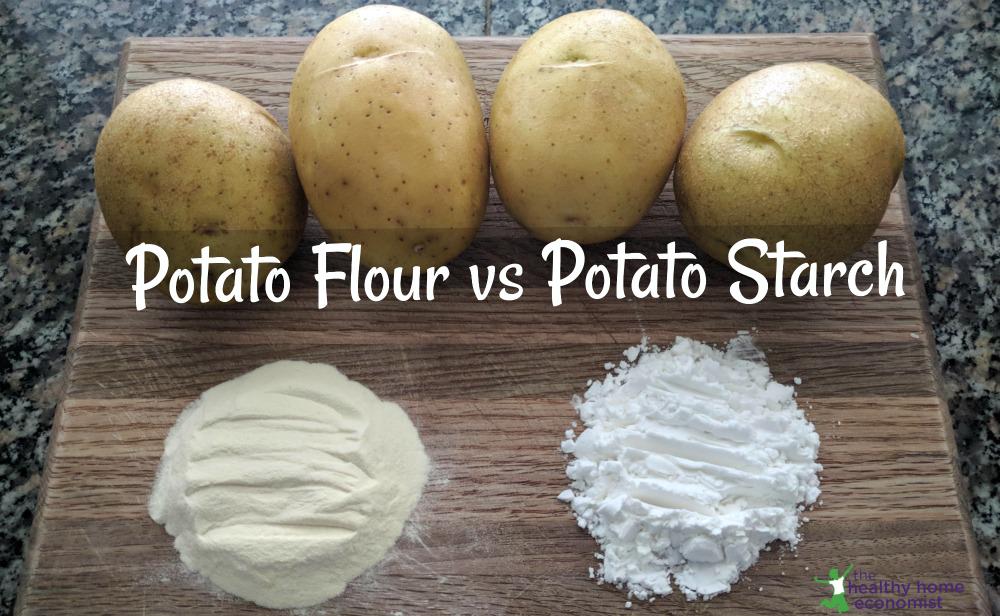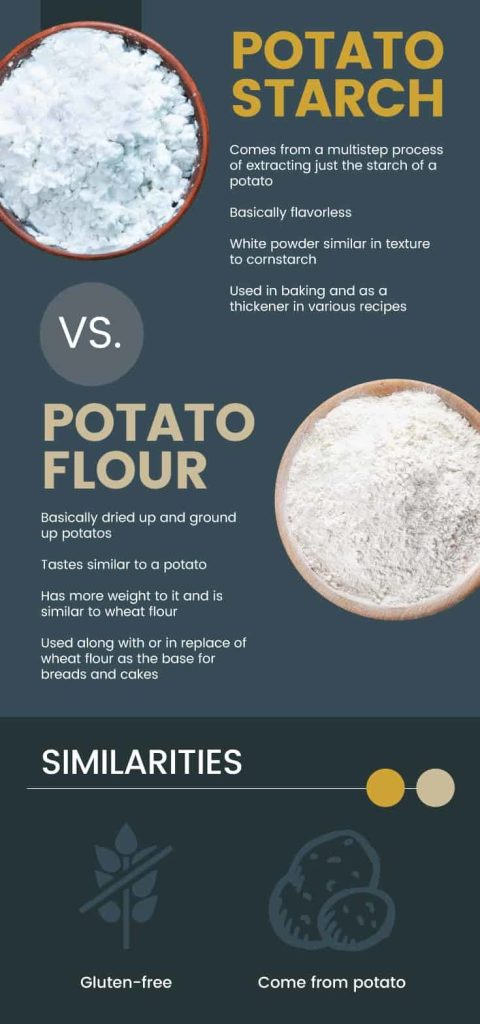If you’ve ever shopped for flour or starch, you may have noticed that there are different types of both ingredients available. But what is the difference between regular wheat flour and potato flour? Is potato flour the same as potato starch? Let’s take a look at the differences between these two products and why they are used differently in cooking.

Table of Contents
Is Potato Flour The Same as Potato Starch?
No, potato flour and potato starch are not the same.
What Is Potato Flour?
Potato flour is a type of flour made from dried potatoes that have been ground into a powder. This type of flour is popular in gluten-free baking because it provides structure to baked goods without any gluten. It has a slightly sweet flavor that pairs well with other ingredients like cocoa or nuts.
However, potato flour contains more moisture than other types of flours, so it’s important to pay attention to measurements when substituting it for regular wheat flour in recipes.
What Is Potato Starch?
Potato starch is a white powder made from processed potatoes that have had most of their moisture removed. Unlike potato flour, this product does not contain any actual potatoes; instead, it’s just the starch from them. Potato starch is also popular as an alternative to wheat-based flours for those who need to follow a gluten-free diet. It has a neutral flavor and can be used in place of cornstarch or tapioca starch as well.
Differences Between Flour and Starch
The main difference between potato flour and potato starch is their levels of protein and fat: potato flour contains more protein and fat than its counterpart.
This means that when used in baking recipes, they will produce different results – while potato starch will create light, fluffy baked goods with a delicate texture, using too much potato flour can make them heavy and dense instead.
Additionally, potato starch tends to absorb more liquid than regular wheat flours so recipes must be adjusted accordingly if substituting it for all-purpose flours in baking recipes.
Potato flour and potato starch are both gluten-free ingredients
Potato flour is made by grinding whole potatoes into a powdery consistency. Because it is made with the entire potato, including the skin, it has more fiber than potato starch. It also contains more vitamins and minerals than its starch counterpart.
Potato starch is made by removing the fiber and proteins from potatoes, leaving behind just the starch. It typically has a finer texture than potato flour and is used in baking to give food a light, fluffy texture. It can also be used as a thickening agent for sauces and gravies.
Both potato flour and potato starch are gluten-free and safe for those with a gluten intolerance or celiac disease. However, they should be used in moderation as they are higher in carbohydrates than other gluten-free flours. When using either of these ingredients, be sure to check the label to ensure that it has not been cross-contaminated with wheat or other grains containing gluten.
Overall, potato flour and potato starch are both gluten-free ingredients that can be used when preparing food for those with a gluten intolerance or celiac disease. They are higher in carbohydrates than other gluten-free flours, so it is important to use them in moderation.
It is also important to check the label of any purchased product to ensure it has not been cross-contaminated. With proper usage, potato flour and potato starch can be a great addition to any gluten-free kitchen.

Continued research into the safety of potatoes as a gluten-free alternative is ongoing, but they are a widely accepted option for those following a gluten-free diet. As always, speak with your health care provider if you have questions or concerns about using any new ingredients in your cooking.
The potential of potatoes as a gluten-free ingredient is exciting, and the fact that both potato flour and potato starch are gluten-free makes them ideal for those on a gluten-free diet.
With proper usage and careful checking of labels, they can be a great way to add flavor and texture to your meals without the worry of cross-contamination. So, go ahead and experiment with potato flour and potato starch in your dishes – you’ll find that they offer lots of delicious possibilities!
Conclusion
In conclusion, there are some key differences between potato flour and potato starch which can impact how your recipe turns out depending on which one you choose to use! Potato flour contains more protein and fat than its counterpart, making it better suited for heavier items like breads or muffins while lighter items such as cakes should use the lighter option of potato starch instead.
Of course, if you’re following a gluten-free diet then either could work depending on the recipe! No matter what you choose though, careful measurements are always important when adjusting recipes to accommodate different ingredients!
References:
https://ift.onlinelibrary.wiley.com/doi/abs/10.1111/j.1365-2621.1979.tb08505.x
https://onlinelibrary.wiley.com/doi/abs/10.1002/star.200390053
https://www.sciencedirect.com/science/article/abs/pii/S0141813022006882








